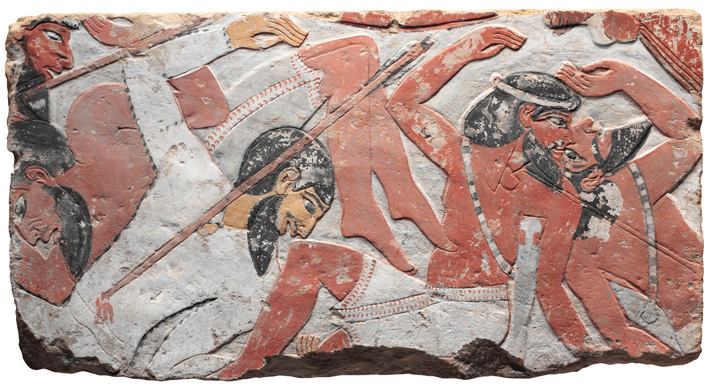If 200,000 Democrats met at the National Mall three weeks before a presidential election, erected an altar and started smashing it while yelling about the GOP candidate getting thrown from a tower, trampled by horses, eaten by dogs and turned into dung, the demand for investigations would be strong.
But when conservative Christians did that very thing last week in protest of Kamala Harris, hardly anyone cared.
Despite the fact that Christian nationalists are three times as likely as other Americans to endorse violence against a political opponent, I imagine if many conservative Christians knew what happened at the “A Million Women” march in Washington, D.C., Oct. 13, they would say that’s going too far and would claim they’re a “different kind of Christian.”

Rick Pidcock
And maybe they are. But the vast majority of evangelicals in the United States promote the theologies this incitement of violence depends on. And while we often talk about theologies of justice, love, worship or community in our conversations about politics, it’s time we name an even more fundamental assumption at play here — the inerrancy of Scripture.
Inerrancy is a threat to our democracy
Biblical inerrancy is a threat to our democracy because it gives authoritarian Christians the perceived right to speak with the authority of God and to defend violence against women.
To make this case, we need to begin by considering a 2015 meeting between Donald Trump and religious leaders in the board room of Trump Tower during Trump’s initial run for the White House. According to the independent charismatic apostle Lance Wallnau, the conversations began by everyone stewing about their common enemy, the media, whom both Trump and the Christian leaders thought were persecuting them.
“I never punch indiscriminately,” Wallnau remembers Trump saying. “I’m a counter puncher. If you get hit and do nothing, it sends the wrong message.”
Another leader said, “It’s open season on Christians in particular.”

Participants in A Million Women smash s cultic altar built just for the event. (Screencap)
Then Trump falsely claimed New Yorkers couldn’t say “Merry Christmas” anymore.
“Every other ideological group in the country has a voice,” Trump told the group. “If you don’t mind me saying so, you guys have gotten soft.”
“That’s the line I won’t forget,” Wallnau explained on social media, looking back.
But Trump had more to say about the challenges facing conservative Christianity.
“People who identify themselves as ‘Christian’ make up probably the single largest constituency in the country but there is absolutely no unity, no punch in exercising that power. Not in political consensus or any other area I can see,” he said.
When the meeting ended and people began to leave, Wallnau took Trump aside and suggested: “The thing we need to do more than anything is to find a way of taking these 10,000 spokes and connect them into a hub of some sort so that there is a unified voice. Our people here need to work together.”
Notice what Trump and these leaders were looking for: a hub that creates a hardened, unified punch in exercising political power.

Donald Trump being prayed over by charismatic evangelistts at the International Church of Las Vegas in 2016. (Screencap from YouTube)
One ring to rule them all
In the opening scene of the Lord of the Rings trilogy, the elf Galadriel narrates, “Nine rings were gifted to the race of men, who above all else, desire power.”
She continues, “For within these rings was bound the strength and will to govern each race. But they were all of them deceived, for another ring was made. In the land of Mordor, in the fires of Mount Doom, the dark lord Sauron forged in secret a master ring to control all others. And into this ring, he poured his cruelty, his malice and his will to dominate all life. One ring to rule them all.”
At the end of the battle against Sauron, Isildor swings his sword at Sauron, slicing off Sauron’s hand and causing the glowing, hot ring to fall to the earth. But before the glow fades, Isildor is able to transcribe a statement that was etched into the inside of the ring.
“In the language of Gollum, an inerrant Bible is authoritarian Christianity’s ‘Precious.’”
Later, when Gandalf appears before the elvish Council of Elrond, the sky grows dark and the elves become fearful as Gandalf reads the inscription, “One ring to rule them all, one ring to find them, one ring to bring them all, and in the darkness bind them.”
In the language of Gollum, an inerrant Bible is authoritarian Christianity’s “Precious.”

Gollum with the ring in “Lord of the Rings: Fellowship of the Ring.” (IMDB)
The Chicago Statement on Biblical Inerrancy
Biblical inerrantists often point to the “Chicago Statement on Biblical Inerrancy” as a modern-day creed of sorts that all biblical Christians must sign on to. The statement originally was put together in a series of three documents in 1978, 1982 and 1986.
In their original statement, authors made the case that inerrancy is about “the authority of Scripture” and that disagreeing with inerrancy is “disloyalty to our Master.” Already, framing the topic in terms of disloyalty to a Master is a hint that the entire framework is about hierarchical power.
More specifically, they claimed: “Scripture is without error or fault in all its teaching, no less in what it states about God’s acts in creation, about the events of world history.”
The 1982 statement says one must have “the right principles for understanding the biblical text” that come from an experiential understanding of the Bible that flows from a “personal knowledge of the God to whom it points.”
They apparently have no self-awareness of how their social location in the top floor of the tower of Babel has affected their lens of interpretation.
When I first pointed this out two years ago, Danny Akin, president of Southeastern Baptist Theological Seminary, said it was “one of the poorest articles” he’d read “in a long time.” But there’s a reason why theology developed in Black communities resonates with Israel’s longing for liberation from Egypt, while theology developed in white communities resonates with Israel’s conquest of Canaan. Our social location affects the way we view Israel’s story, Scripture, worship and the world.
“Our social location affects the way we view Israel’s story, Scripture, worship and the world.”
In the 1986 statement, where they apply the doctrine of inerrancy, the authors claim it requires one to view the “husband as head” and the wife “as helper in submissive companionship,” and that one must agree with conservative evangelical views of “sexual deviations,” politics, war, economics, work, wealth and poverty, and environmentalism.
The group of initial signers, made up overwhelmingly of powerful white men, said doubting inerrancy leads to “loss of clarity” and “loss of muscle.” And they concluded that “anyone who allows Scripture to deliver its own message on these matters will end up approximately where we stand ourselves.”
Of course, where they stand just happens to be on a series of theological propositions that require everyone to be in submission to them. So with their language about clarity, muscle and authority, it sounds exactly like what the men in Lord of the Rings wanted, as well as what Trump and Wallnau talked about in 2015.
Thus, when they make the case that “belief in the inerrancy of Scripture is basic to maintaining its authority,” what they’re really saying is that belief in the inerrancy of Scripture is basic to maintaining their authority.

A fragment of a painted limestone relief dating to about 1400 B.C. from Thebes in Egypt depicts defeated Canaanites.
(Image copyright © The Metropolitan Museum of Art)
The Canaanite conquests and the wars of David
One of the most common objections to biblical inerrancy is the violence prescribed in the Law of Moses and in the conquest narratives. From commands to cut off your woman’s hand and show her no pity to stoning your children and beating your slave, there are plenty of reasons either to take issue with the text or to come up with alternative readings.
But inerrantists have to defend these actions as good. One of the staunchest defenders of inerrancy over the past century was R.C. Sproul. One devotional on his Ligonier website says: “Armies in the ancient world, just like many armies today, did not simply leave the city after the battle was over. Instead, they would take booty or spoil or treasure from the city. This wealth could include things such as silver and gold, valuable livestock, precious jewels, and other treasures, and the prospect of gaining such riches could be a valuable incentive to encourage soldiers to join the fight. Enjoying access to a large amount of treasure could change one’s life, so there was great rejoicing on the part of an army when it discovered a great deal of wealth after a battle. This was a reality even for the armies of Israel. God permitted them on many occasions to possess the treasure they found after an expedition.”
This article is suggesting God encouraged young men to fight wars by enticing them with booty. The paragraph ends with a reference to Deuteronomy 20:14b. But what it conveniently doesn’t mention is that Deuteronomy 20:14a says “the women and the little ones … shalt thou take unto thyself.”
“Sproul once agreed with the slaveowner Jonathan Edwards’ claim that salvation was ‘the holy rape of the soul.’”
Taking women and children as booty? It’s one thing for God to entice men with silver and gold as booty. It’s an entirely different conversation if God entices men with women and children as booty.
Then the very next chapter says the Israelites could take sexually attractive women as captives to become their wives as long as they followed a particular process. And then in Numbers 31, the Israelites were to save virgin women as part of the booty alongside the animals.
Inerrantists like Sproul are required to defend this as good. Some scholars are so committed to inerrancy regarding these passages that they’ve actually published academic works claiming they’ve found “some surprisingly positive developments around war rape.”
And it makes sense that Sproul would be in their company, given how he once agreed with the slaveowner Jonathan Edwards’ claim that salvation was “the holy rape of the soul” and added, “Some people are violently offended by that language. I think it’s the most graphic and descriptive term I can think of, of how I was redeemed.”

Flags waving at “Kingdom to the Capitol” event in October 2024. (BNG photo by Rick Pidcock)
Inciting violence against women
But unfortunately, the harm being caused by inerrancy isn’t limited to the homes and churches of white evangelicals. It’s now being spread through social media and in our nation’s capital.
Pastor Joel Webbon, who has 24,000 followers on X and was one of the organizers behind the “Christ is King: How to Defeat Trashworld” conference, said, “Hashtag Me Too would end real fast.” How does he suggest to accomplish that goal? He says, “All you have to do is publicly execute a few women who have lied.”
Megachurch pastor Kent Christmas accused Kamala Harris of “changing the DNA and sexually altering 3-year-old babies” and said anyone who votes for her must “pay the price.”
At the “A Million Women” march last weekend, women in attendance were called “Esther” while the men were called “Mordecai.” According to the biblical story, after Esther speaks with the king, the king gives permission for the Israelites to completely destroy their enemies, which ends in the violent death of 75,000 people.

Che Ahn
When pastor Che Ann took the stage at the march, he called Trump “Jehu” and Harris “Jezebel.” According to the biblical story, Jehu commands that Jezebel be thrown out of a tower. Then he tramples over her with his horse and lets his dogs eat her in order to turn her body into dog dung. And to make matters worse, this violence was prophesied by Elijah, just like the parallel prophecies today are being made in front of 200,000 people gathered at the U.S. Capitol who are whipped up into a frenzy through worship music.
“These are the roles people are given to play at the Million Women march,” Bradley Onishi said on the Straight White American Jesus podcast. “This is the way the stories end — in mass death or a woman’s body being reduced to dog food. This is the same thing that happened pre-January 6 with the Jericho Marches.”
In a lengthy thread detailing his experience at the march, Matthew Taylor said, “I’m honestly more worried about the role this event will play if Trump loses. We saw, in late 2020, how NAR-led mass events like these, leading up to the election, segued directly into Jericho Marches and spiritual warfare at the Capitol on January 6. If Trump loses, I fear we will look back on the Million Women March as a mass radicalization event. Of course, if real violence occurs, the NAR leaders will deny it had anything to do with them and claim this was just an event about revival, saving America from her demons. Just worship and prayer, nothing to see here.”
But as Taylor points out, “History shows spiritual violence begets real world violence.”
Of course, inerrantists like Sproul who don’t believe prophecy continues to this day would say they’re completely different than the independent charismatic apostles and prophets who say these things. But they support the theology that such prophecies and actions depend on by claiming these violent stories are good and unquestionably accurate portrayals of God and God’s people.

(123rf.com)
Incompatible with love
In his discussion with Onishi about the “A Million Women” march, Dan Miller said: “You cannot be a biblical inerrantist and affirm a loving God. Sorry, but you can’t. … There are so many stories in the Hebrew Bible. And I can give you … all the cultural and historical background of why those stories are and situating within ancient Near Eastern culture and so on and so forth. But if you’re going to say this is what God is and always has been and always will be, and this is the God we currently worship, then don’t give me the love stuff.”
“If you’re going to say this is what God is and always has been and always will be, and this is the God we currently worship, then don’t give me the love stuff.”
Wholeness is incompatible with hierarchy and genocide. So inerrancy is incompatible with wholeness and must be discarded in order to cut off the justification for authoritarians of all kinds who wield the Bible like a ring of power.
Here’s the truth about the Bible.
The Bible was written in an ancient patriarchal culture and thus speaks to spiritual reality in ancient hierarchical language. Inspiration could entail God meeting them in that culture, revealing who God is in language and metaphors they could understand. That makes sense of a lot of what we see in the Bible.
But the problem with inerrancy is that its defenders embrace the ancient cultural metaphors and stories used in the Bible and apply them to today in the name of biblical authority and thus perpetuate ancient hierarchy the biblical authors may actually have been subverting or accommodating in some way.
That’s how we end up with Al Mohler or John MacArthur defending slavery. And it’s why so much of the conversation about inerrancy today devolves into inerrantists trying to defend ancient relational structures, power dynamics or violent behaviors that caused harm or mass death.
So if Christians want to believe in the Bible as inspired revelation in some way, that’s fine. But inerrancy is too tied to furthering and justifying ancient metaphors and stories to foster wholeness since the terms and worldviews back then were violent hierarchical metaphors of empire.
Loving your neighbor as an overflow of doubt
Often, inerrantists respond by saying, “But if you lose inerrancy, you lose your objective standard for morality and your assurance of salvation!”
But just remember, people who defend genocide or prophesy violence against women don’t hold the moral high ground over those who defend basic human kindness. It really is that simple. If their theology is true, then morality is relative to power.
“By loosening your grip on the Bible, you actually open your heart toward yourself and your neighbor.”
If you begin to doubt inerrancy, then you might lose some certainty. But authoritarian Christians also will lose their need to defend and incite violence against women. So by loosening your grip on the Bible, you actually open your heart toward yourself and your neighbor.
The writers of the Chicago Statement, independent charismatics like Wallnau and politicians like Donald Trump all want clarity and muscle and fear being soft.
But maybe a softening toward one another is exactly what we need for the survival of our democracy. Maybe that’s how actual healthy relationships grow. And maybe doubting inerrancy could provide that softening so that we’ll lay down our rings of power and our weapons of warfare.
As The Brilliance sings,
Give me doubt so I can see my neighbor as myself.
Give me doubt so I can lay all my weapons on the ground.
When the armor of God is too heavy for peace,
Give me doubt. Give me doubt.
Rick Pidcock is a 2004 graduate of Bob Jones University, with a bachelor of arts degree in Bible. He’s a freelance writer based in South Carolina and a former Clemons Fellow with BNG. He completed a master of arts degree in worship from Northern Seminary. He is a stay-at-home father of five children and produces music under the artist name Provoke Wonder. Follow his blog at www.rickpidcock.com.
Related articles:
A tale of two rallies on the same day in North Carolina | Analysis by Rick Pidcock
What explains the abiding appeal of biblical inerrancy? | Opinion by Alan Bean
How the Chicago Statement on Biblical Inerrancy became a litmus test | Analysis by Rick Pidcock
Why biblical inerrancy should be a litmus test | Analysis by David Bumgardner


